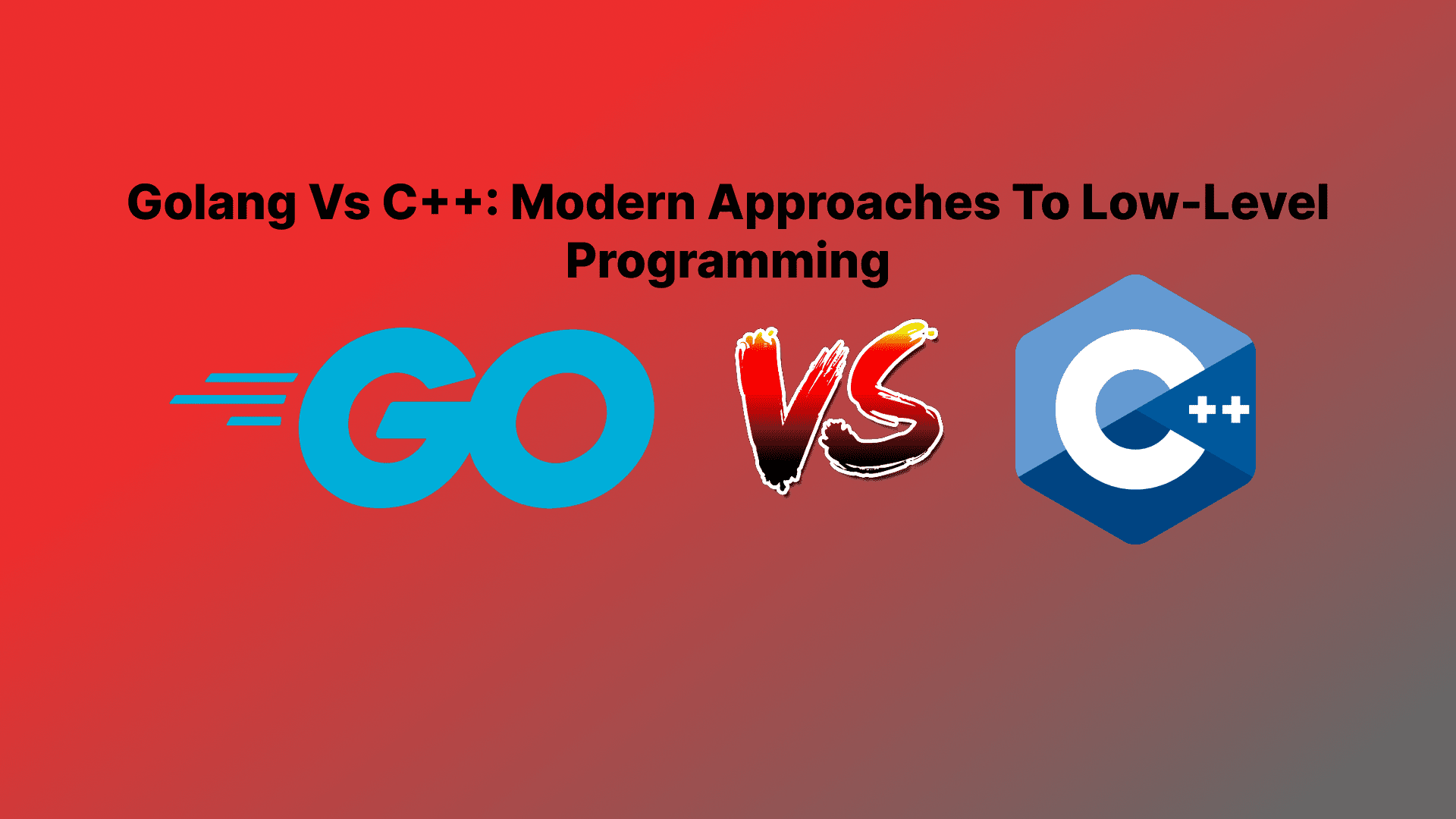Golang Vs C++: Modern Approaches To Low-Level Programming
- With Code Example
- September 6, 2024
Navigating Performance, Simplicity, and Safety in Systems Development
Series - Golang Vs
As a software engineer with over 15 years of experience in both high-level and low-level programming, I’ve had the opportunity to work extensively with both Golang and C++. Today, I want to share my insights on how these two powerful languages approach low-level programming in the modern era.

Introduction: The Landscape of Low-Level Programming
Low-level programming has traditionally been the domain of languages like C and C++, offering direct hardware access and fine-grained control over system resources. However, with the advent of Golang in 2009, developers gained a new tool that promised to simplify systems programming without sacrificing performance.
Memory Management: Manual vs. Automatic
One of the most significant differences between C++ and Golang lies in their approach to memory management.
C++: Fine-Grained Control
C++ gives developers complete control over memory allocation and deallocation. This level of control can lead to exceptional performance but also comes with significant responsibility.
#include <iostream>
class MyClass {
public:
MyClass() { std::cout << "Object created\n"; }
~MyClass() { std::cout << "Object destroyed\n"; }
};
int main() {
MyClass* obj = new MyClass();
// Use obj
delete obj; // Manual deallocation
return 0;
}
In this C++ example, we manually allocate and deallocate memory. This fine-grained control allows for optimized memory usage but can lead to issues like memory leaks if not handled correctly.
Golang: Simplicity and Safety
Golang, on the other hand, employs a garbage collector, abstracting memory management away from the developer.
package main
import "fmt"
type MyStruct struct{}
func (m *MyStruct) finalize() {
fmt.Println("Object destroyed")
}
func main() {
obj := &MyStruct{}
runtime.SetFinalizer(obj, (*MyStruct).finalize)
// Use obj
// No need to manually free memory
}
While this approach simplifies development and reduces the risk of memory-related bugs, it can introduce some performance overhead and less predictable memory usage patterns.
Performance: Raw Speed vs. Balanced Efficiency
C++ is renowned for its performance, allowing developers to write code that runs very close to the metal. Golang, while not always as fast as optimized C++, offers impressive performance with the added benefits of simpler syntax and built-in concurrency.
C++: Unleashing the Hardware
C++ allows for aggressive optimizations and direct hardware manipulation:
#include <chrono>
#include <iostream>
#include <vector>
#include <algorithm>
int main() {
std::vector<int> v(10000000, 1);
auto start = std::chrono::high_resolution_clock::now();
std::sort(v.begin(), v.end());
auto end = std::chrono::high_resolution_clock::now();
std::chrono::duration<double> diff = end - start;
std::cout << "Time to sort: " << diff.count() << " s\n";
return 0;
}
This C++ code demonstrates high-performance sorting of a large vector, utilizing the standard library’s optimized algorithms.
Golang: Simplicity Meets Speed
Golang provides solid performance with a more straightforward syntax:
package main
import (
"fmt"
"sort"
"time"
)
func main() {
slice := make([]int, 10000000)
for i := range slice {
slice[i] = 1
}
start := time.Now()
sort.Ints(slice)
duration := time.Since(start)
fmt.Printf("Time to sort: %v\n", duration)
}
While this Golang code might not be as fast as the optimized C++ version, it’s remarkably close in performance while being simpler to write and understand.
Concurrency: Threads vs. Goroutines
Both C++ and Golang offer powerful concurrency features, but their approaches differ significantly.
C++: Flexible but Complex
C++ provides low-level threading primitives and, since C++11, a standard threading library:
#include <iostream>
#include <thread>
#include <vector>
void worker(int id) {
std::cout << "Worker " << id << " started\n";
// Simulate work
std::this_thread::sleep_for(std::chrono::seconds(1));
std::cout << "Worker " << id << " finished\n";
}
int main() {
std::vector<std::thread> threads;
for (int i = 0; i < 5; ++i) {
threads.emplace_back(worker, i);
}
for (auto& t : threads) {
t.join();
}
return 0;
}
This approach gives developers fine-grained control but requires careful management of shared resources and synchronization.
Golang: Simplified Concurrency
Golang’s goroutines and channels make concurrent programming more accessible:
package main
import (
"fmt"
"time"
)
func worker(id int, done chan bool) {
fmt.Printf("Worker %d started\n", id)
time.Sleep(time.Second)
fmt.Printf("Worker %d finished\n", id)
done <- true
}
func main() {
done := make(chan bool, 5)
for i := 0; i < 5; i++ {
go worker(i, done)
}
for i := 0; i < 5; i++ {
<-done
}
}
Golang’s approach simplifies concurrent programming, making it less error-prone and more scalable, especially for network-heavy applications.
Compilation and Tooling
C++ compilation can be complex, often requiring external build systems like CMake for large projects. Golang, by contrast, offers a simpler, built-in build system and faster compilation times, which can significantly improve developer productivity.
Safety and Modernity
Golang was designed with modern programming practices in mind, including memory safety and easier concurrency. C++, while continuously evolving (e.g., C++20 standard), carries more historical baggage, which can sometimes lead to more complex and potentially unsafe code if not carefully managed.
Conclusion: Choosing the Right Tool
Both Golang and C++ are powerful languages for low-level programming, each with its strengths:
- Choose C++ when you need absolute control over hardware resources, are working on performance-critical systems, or are developing within existing C++ ecosystems.
- Opt for Golang when you want to balance performance with developer productivity, especially for networked services, concurrent applications, or when you need rapid development cycles.
In my experience, the choice often comes down to the specific requirements of the project, the team’s expertise, and the long-term maintenance considerations. Both languages continue to evolve, with C++ adding more safety features and Golang optimizing for even better performance.
As with any technology choice, it’s crucial to evaluate your project’s needs carefully. Sometimes, the best approach might even involve using both languages, leveraging C++ for performance-critical components and Golang for networked services and overall application structure.
Whichever path you choose, both Golang and C++ offer robust solutions for modern low-level programming challenges. Happy coding!





